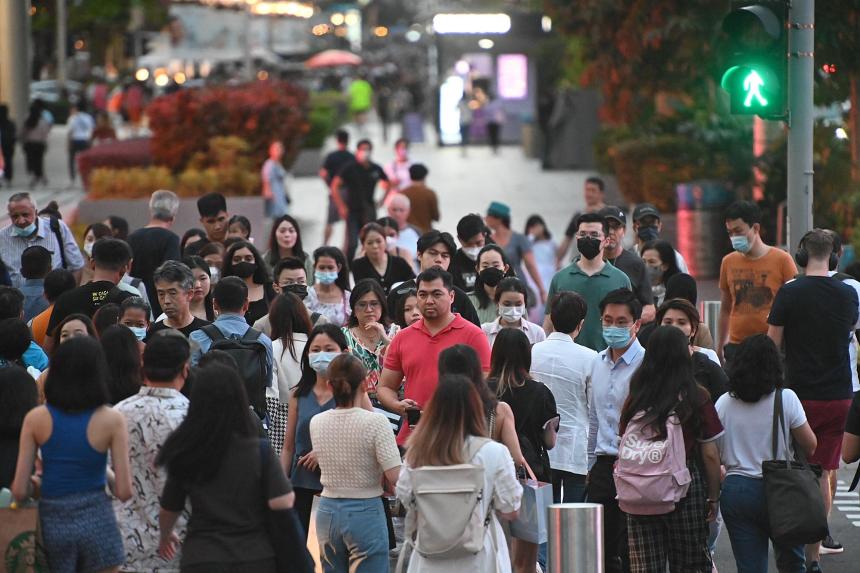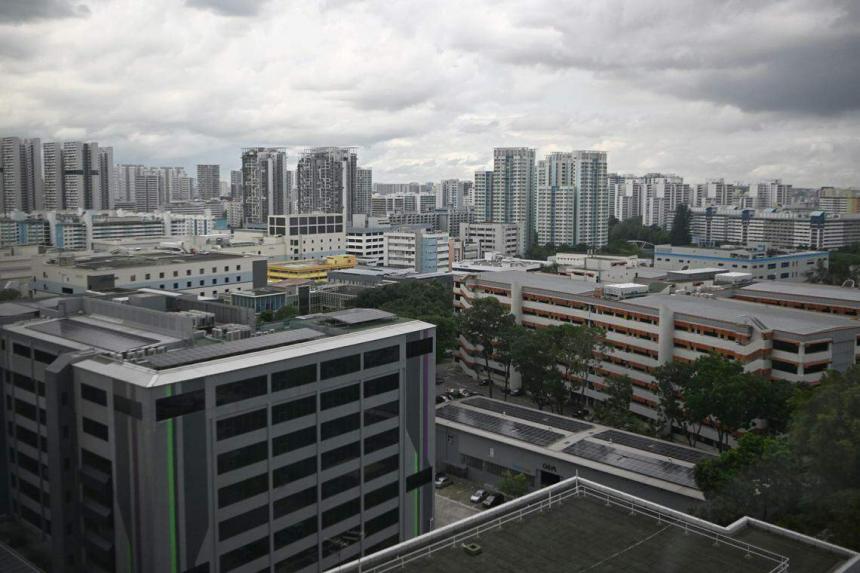Singapore dream turned sour: How upgrading and a culture of getting ahead became corrosive
Instead of talking about upgrading one’s home, education and job, let’s focus on progressing together

The culture of materialistic aspiration – that narrative about working hard in school, getting good grades so one can get a good job that opens the door to a good life – has come home to roost, and the results are not pretty.
After all, embedded in the idea of the so-called Singapore Dream is intense interpersonal competition. Be the top student in school. Outbid other buyers for that home or car. Be No. 1 in your job. Such notions are inbred in Singaporeans.
But hyper-competition has a dynamic that ensures its own destruction, as “every man for himself” makes everything harder and more expensive to attain, eventually exhausting everyone and depleting the collective reservoir of goodwill.
This is the corrosive outcome of arms-race mindsets, whether applied in weapons acquisition, sending your children to private tuition to outdo other children, joining the Build-To-Order queue earlier to increase your chances of getting a flat, or outbidding others for a certificate of entitlement for your car.
Individual winners may take the top prize but the overall society is worse off when everyone is forced to work too hard to attain even just a participation spot.
Singapore is at a juncture when the internal contradictions of its hyper-competitive system are becoming apparent, causing much angst, from the low- to middle- to high-income residents. They worry if they can attain the essentials of modern life – a home, job, school for their children and caregiving for frail family members. Those who are wealthy, still worry – about access to good schools and whether their children can do as well in a game they themselves excelled in.
The anxiety was reflected in Parliament over the past two weeks as MPs debated the Budget. Leader of the Opposition and Workers’ Party chief Pritam Singh warned of the emergence of two Singapores: a high-salary and high opportunities group connected to the global world, and another where most Singaporeans reside, “where there are perceptions of slowing social mobility, connected to the reality of high housing prices”.
His proposal to prevent this cleaving: “Redistribution must be at the core of government policies.”
In fact, the narrative around what makes for success in Singapore has been slowly changing in the past decade, as Singaporeans awaken to the negative effects of hyper-competition.
At the policy level, moves have been under way to level up access to life needs, with much more generous support channelled to the low- and middle-income, especially in childcare and eldercare. Solutions are being tried out to improve social mobility, such as making sure Primary 1 places remain accessible to those with no prior links to the school. The tax system is getting more progressive – for example, Budget 2022 raised marginal tax rates on the highest income earners.
Beyond fiscal and public policy changes, which are decided on by the Government, what can citizens do to cope with this spiral of rising costs and aspirations, short of emigrating or giving up or remaining grouchy complainers?
I want to suggest one, which is to change our own mindsets, individually and collectively as a society. For starters, we need to look at past narratives about success, see where they fall short and find how they can be updated.
The corrosive effects of too much upgrading talk

Take the upgrading of homes. Decades of being bombarded by the narrative of asset enhancement of Housing Board flats have encouraged Singaporeans to see their flats as an asset more than as a home.
To be sure, the asset enhancement programme began well in the 1990s, as a way to rejuvenate ageing HDB estates. Then there was Sers, or Selective En bloc Redevelopment Scheme, which tore down old blocks of flats, and built replacement flats at discounted prices for those affected. The terms were so attractive, to have one’s block “Sers’ed” was akin to winning the lottery.
The allure of making money from selling flats became a national obsession. Young couples bought new HDB flats in hopes of “flipping” them five years later for capital gains, which like all such gains in Singapore, are untaxed. A median income couple lucky enough to get a flat in a prime location can make up to half a million dollars from such a trade.
The net result: From the 1990s, HDB flats came to be viewed as tradeable assets, albeit subject to HDB ownership rules on five-year minimum occupation periods. A rentier mindset developed, where people realised they could make more money “speculating” on one HDB flat than from years of savings from their work income. This bred more speculative behaviours, which fed back into the housing market to cause more price spirals.
And so a vicious circle was formed.
Which brings us to today’s high HDB resale prices. The HDB resale price index in the fourth quarter of 2022 reached 171.9, a historic high. In the fourth quarter of 2019, it was 131.5.
The Government has argued that the current high resale flat prices are cyclical, due to a short-term backlog of new HDB flats because of the Covid-19 pandemic. This may be so, and the resale price index may indeed fall from today’s highs when the flat supply stabilises. It is also right to point out that resale prices fell in the 2013 to 2019 period.
But over the entire period from 2008 to 2022, the trend line has been clearly up. The rise is driven by strong economic fundamentals and a growing population – and underpinned by a culture of upgrading and aspirations that ensures a steady supply of buyers jumping onto the conveyor belt to bid up prices.
What would be helpful is to remake the narrative around HDB flats so they are viewed more as homes and less as money-making assets to be discarded when one has the means to upgrade. This message can be reinforced more strongly, perhaps with prominent leaders talking about their own lifestyle choices to raise families in, and to grow old in, HDB flats. Until Singaporeans intuitively view HDB flats as cherished homes to live and age in, they will continue to be treated by many as disposable assets to be sold for gain.
‘Arms race’ in education and jobs
Next, education.
The culture of individual aspirations can play out negatively across a society into a kind of “arms race”. A vivid example of such a dynamic is private tuition.
When the prizes for academic merit go to those who shine in exams, every parent who can afford to will pay to get their child extra tuition to excel in them. The net result: A ratcheting up of expectations and exam grades, leading to higher stress and higher costs all round. Who bears the brunt of this? The children.
Then there are degrees and jobs. Singaporeans have a tendency to classify jobs into white or blue collar, into office work or menial, “dirty” trades. The ticket out of a menial trade job is traditionally a degree.
There remains a big pay differential between those with and without a degree, with degree-holders earning 62 per cent more than diploma holders, and twice the amount that those with Institute of Technical Education qualifications make.
There is a tendency in many industralised countries to overvalue cognitive work over those who work with their hands or are in care work. In the 2020 book Head Hand Heart: The Struggle For Dignity And Status In The 21st Century, British writer David Goodhart warned about the over-reach of “cognitive meritocracy”, which has created a system he calls “peak head”.
This places those with head skills (cognitive ability) above those with hand and heart skills (those in manual and caring jobs). The result is a lopsided system that over-rewards those with head skills, leaving those with hand and heart skills languishing behind in wages, status and respect, and feeling alienated.

The antidote for such a cognitive-based social system? To value hand and heart work as highly as head work, especially in how they are regarded socially, and to narrow the wage gap between head and other types of work. Narrowing this gap cannot be done by lowering wages for high-skilled cognitive talent, who are mobile and can move to where they are more valued. Instead, it is wages at the median and lower level that have to be levelled up.
This is precisely what Singapore is doing. The ongoing effort to roll out the Progressive Wage Model to more sectors (extended to the food services sector from Wednesday) will have a big impact on raising wages for many tradespeople. Longer term, the move must be to professionalise all jobs so they can be better paid, a call made by Mr Ravi Menon, managing director of the Monetary Authority of Singapore, in a lecture in 2021.
The antidote to undervaluing heart and hand work and overvaluing head work: Make sure every job is a well-paying job.
Not me getting ahead, but us progressing together
Taken together, what all this means is that the old narrative about getting ahead of others to stay on top – in school, work, to get a home or car – needs updating.
Those who are leaders, elders or parents have to quickly change their own mindsets and expectations, to tell a story about Singapore’s future that is not overburdened by the drive for ever-higher material aspirations. Outbidding others for material aspirations drains mental and physical health, especially as these goods become increasingly unattainable except by the high-income.
Instead, we should tell our children a different story about Singapore from what our parents told us. One not focused on constant upgrading and relentless achieving, but on doing our best. One not focused on getting ahead of others, but on progressing together.
This is a place where every school is a good school, so parents don’t need to send their children to tuition to outdo the rest, and children have time to play.
Because every child has talent, and the school system and society will support them to find it so they can flourish. Where the hallmark of success in school is not your Primary School Leaving Examination or O-level score, but how much you enjoyed school and whether your curiosity and creativity were kindled and you emerged a keen learner for life.
And when you enter the workplace, it does not matter which school you went to, because every job is a good job – respected, with a good living wage. The hallmark of work success is not how much you earn – because you will have enough for a decent life – but how well you do your craft, how respected you feel by colleagues, customers, and the society at large, and how you contribute to society.
Where whatever job you do, you earn enough to buy an HDB flat, where every flat is a good home. Success in the home ownership journey is not defined by the size of your home, but by how happily you raised a family in one, how anchored your children feel in their neighbourhood, and how secure you feel about ageing there.
Redefining the metrics of success in the home, education and job arena can make all the difference between whether we feel happy with what we have, or whether we are constantly hankering after what we cannot attain. (This should by no means be interpreted as copping out of life’s challenges. Even as we recalibrate our personal and societal aspirations, we should not stop our efforts to make our society fairer and more progressive, or to push for sociopolitical change or fiscal reform.)
When we focus on making every school a good school, every HDB flat a good home, and every job a good job, we will talk less about getting ahead of others and more about progressing together. The emphasis is not just on progress, but really on “together”.
Join ST's Telegram channel and get the latest breaking news delivered to you.








No comments:
Post a Comment